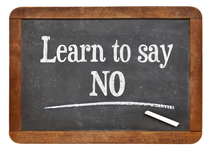
Knowing when to say no, and how to say no, is not always straightforward to us. It can get mixed in with all sorts of emotions that can confuse the correct response for you. Often we don’t want to hurt another person’s feelings. Or we are not placing enough importance on our own worth and end up compromising ourselves.
How can you say no, more successfully? Here’s 6 tips to follow:
- Be very clear about your own personal values and be prepared not to compromise them. Many of us can’t actually state our values - those things that we believe are important in the way we live and behave. When the things that we do and the way we behave match our values, life is usually good – we're satisfied and content. But when these don't align with our personal values, that's when things feel wrong and can be a real source of unhappiness. When we say yes to something that is at odds with our values, it can lead to regret and unhappiness. So be very clear of what is not-negotiable to you and use that as a cue to say no.
- Understand that saying no isn’t easy. It can make us feel awkward, anxious, fearful or guilty. It may be linked in with complicated stories and emotions from the past, such as I’m only worthy when I please others or I need be liked or belong. Just recognising that feelings of discomfort are normal when saying no, can help you be better prepared to overcome them.
- With practice, it does get easier! Like anything, the more we do it, the better we become. So recognise that you might need to dig deep early on but it should be easier with practice.
- To build your skills with saying no, it’s best to start small and have some success. Try saying no to lunch with a colleague who always wants to whinge and complain. Better still, start with yourself. Say no to staying in bed when you’d plan to go to the gym.
- Make a list of all the things that you’d like to say no to. Be on the front foot by being prepared for the no before the situation arises. This will reduce the angst that it may cause you, so increases your chance of success.
- Say no from a place of love and kindness – to yourself and to the person you’re delivering it to. Don’t say no from a place of anger or frustration. Prepare a few lines that you can use to say a kind, yet firm no. When it is delivered from a place of peace and love, it has a greater chance of being received well. Be kind to yourself when saying no to that chocolate (no I won’t eat that chocolate because I nurture and care for my body) and be kind to others when you say no their requests (thanks for kind invitation to lunch, however I had already planned to take a brisk walk in the break because I’ve made a commitment to look after myself better).


 RSS Feed
RSS Feed